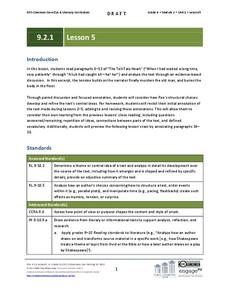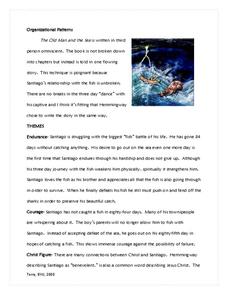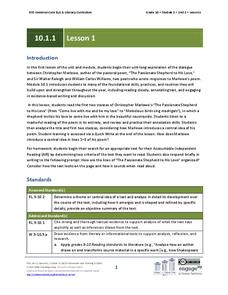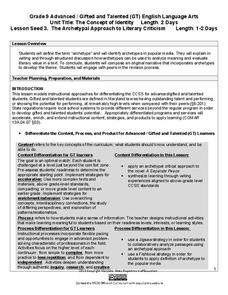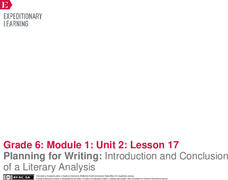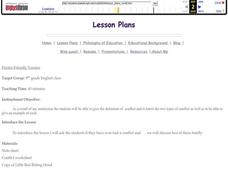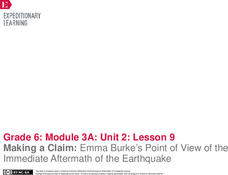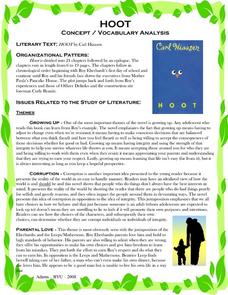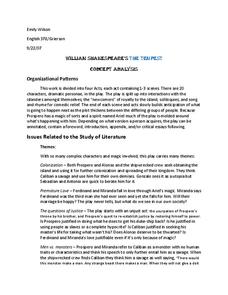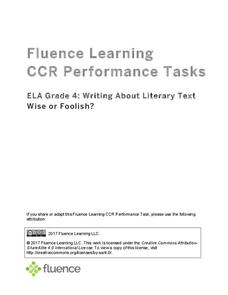EngageNY
Grade 10 ELA Module 1: Unit 1, Lesson 4
Guide high schoolers through the most successful and efficient ways to address a text with a literary analysis instructional activity. As learners find examples of alliteration in Christopher Marlowe's "The Passionate Shepard to His...
EngageNY
Grade 9 ELA Module 2: Unit 1, Lesson 5
Eager readers have waited a long time, very patiently, for a set of literary analysis lessons that connect text structure to the work's central idea. As ninth graders continue reading "The Tell-Tale Heart," they focus on the central...
Curated OER
The Old Man and the Sea: Concept Analysis
Use a helpful concept analysis guide when planning your unit on Ernest Hemingway's The Old Man and the Sea. The resource covers plot elements, literary themes, and possible issues to address in order to make the work accessible to all of...
Fluence Learning
Writing About Literature: What Is Happiness?
Jack London's heart for adventure has come to define the spirit of America and its frontier. Selected passages from the foreword The Cruise of the Snark take eighth graders through London's construction and voyage of his ship before...
EngageNY
Qualities of a Strong Literary Argument Essay
One activity, two essays, and one central theme: qualities of an argument essay. Here, scholars first describe the qualities of an argument essay regarding Bud's rules to live by from the novel Bud, Not Buddy by Christopher Paul Curtis....
EngageNY
Grade 10 ELA Module 1: Unit 1, Lesson 1
Can authors speak to each other across works, genres, and centuries? Study the conversation between Christopher Marlowe in his poem "The Passionate Shepherd to His Love" and the responses by Sir Walter Raleigh and William Carlos Williams...
EngageNY
Grade 9 ELA Module 2, Unit 2, Lesson 10
The slow curse of realization begins to sink in during the tenth lesson in a literary analysis unit on Sophocles' Oedipus the King. Ninth graders carefully read the selected lines for evidence of Oedipus' feelings during a turning point...
Maryland Department of Education
The Concept of Identity Lesson 3: The Archetypal Approach to Literary Criticism
As class members continue their study of approaches to literary criticism, readers examine the symbolism and archetypal patterns in John Knowles' A Separate Peace, and how these parallels are used to develop a theme in the story.
Novelinks
Sense and Sensibility: Concept Analysis
If you need an anchor for your unit on Sense and Sensibility, use a concept analysis with key discussion points. It includes literary themes, vocabulary, background information, and suggestions for addressing gender and diversity questions.
EngageNY
Grade 9 ELA Module 1, Unit 1, Lesson 17
Eighth graders demonstrate their understanding with the final assessment in a literary analysis unit based on Karen Russell's short story, "St. Lucy's Home for Girls Raised by Wolves." Having prepared for the assessment in the last few...
EngageNY
Grade 10 ELA Module 1: Unit 3, Lesson 14
A thorough unit on literary analysis and character development culminates in a final writing assessment. Prompted to compare the parent-child relationships in Amy Tan's The Joy Luck Club and H.G. Bissinger's Friday Night Lights, high...
Infobased Learning
Bloom's Literature: How to Write about Nineteen Eighty Four
A good prompt is hard to find, especially ones that encourage application, analysis, synthesis, and evaluation of a text. Help is here in the form of a prompt list for George Orwell's Nineteen Eighty Four that offers essay topics that...
Ohio Department of Education
A Glossary of Literary Terms
If you're tired of defining allusion, onomatopoeia, and satire for your language arts students, hand out a complete list of literary devices to keep the terms straight. Each term includes a definition that is easy to understand and...
Curated OER
Lesson: Urs Fischer: Reviving the Past Art Movements
Seven major abstract art movements are analyzed by learners in groups. Each group analyzes various works by determining which work belongs to which movement. They then read Flatland, engage in an art and literary analysis discussion,...
EngageNY
Planning for Writing: Introduction and Conclusion of a Literary Analysis
It's all about the introduction. Scholars work on the introductory paragraph for their essays, connecting the theme of a myth and The Lightning Thief. They use a graphic organizer to help focus their work and then move to working on the...
EngageNY
Peer Critique and Pronoun Mini-Lesson: Revising Draft Literary Analysis
See what peers really think. Scholars give a peer critique of the their essay drafts from the previous lesson. They then participate in a mini lesson about pronouns. Pupils write examples of each type of pronoun on sticky notes and put...
Curated OER
Conflict
Though the lesson plan format is simplistic, it's got some good ideas for addressing internal and external conflict in your literary analysis unit. Using "Little Red Riding Hood" and other fairy tales, young readers identify the...
Curated OER
Flannery O'Connor's "A Good Man is Hard to Find": Who's the Real Misfit?
Students discuss the characteristics of the literary genre known as "Southern Gothic". They write an analysis of the short story, "A Good Man is Hard to Find" by Flannery O'Connor.
EngageNY
Making a Claim: Emma Burke’s Point of View of the Immediate Aftermath of the Earthquake
Sharpen those pencils; it's time to write! Scholars begin writing the first body paragraph of their literary analysis essays. Additionally, pupils use graphic organizers to analyze a character's point of view from Laurence Yep's...
Curated OER
Hoot: Concept/Vocabulary Analysis
Augment your unit on Carl Hiaasen's Hoot with a series of activities about the environment, civil disobedience, making an impact in the world, and growing up. A list of literary concepts and themes helps you to write your lessons to...
Novelinks
The Little Prince: Concept/Vocab Analysis
Focus on the literary elements of Antoine de Saint-Exupéry's The Little Prince with a concept analysis sheet. With suggestions and explanations for many of the book's concepts, vocabulary, and other issues that may arise in instruction,...
EngageNY
Making a Claim: Moon Shadow’s Point of View of the Immediate Aftermath
Body paragraphs are the building blocks of every essay. Pupils view and discuss a model essay using a rubric to evaluate one of its supporting paragraphs. Next, scholars use what they've learned to continue drafting their own literary...
Novelinks
The Tempest: Concept Analysis
Use a handy concept analysis guide as you begin your unit on William Shakespeare's The Tempest. With character descriptions, literary themes, and anticipated affective issues, the guide can help those new to using The Tempest craft a...
Fluence Learning
Writing About Literary Text: Wise or Foolish?
A three-part assessment promotes reading comprehension skills. Class members read literary texts and take notes to discuss their findings, answer comprehension questions, write summaries, and complete charts.



